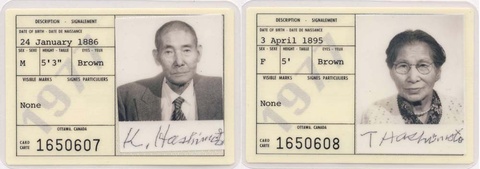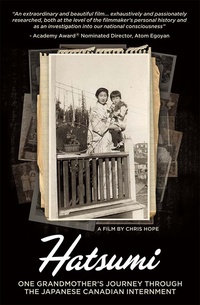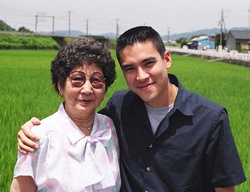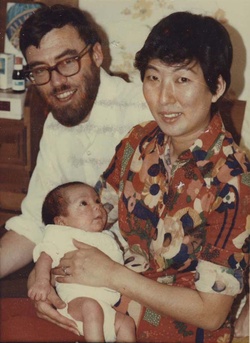“An extraordinary and beautiful film…exhaustively and passionately researched, both at the level of the filmmaker’s personal history and as an investigation into our national consciousness”
—Academy Award® Nominated Director, Atom Egoyan
Thus far in 2012, the 70th anniversary of internment, there has been no greater artistic tribute to the generation of Nikkei that survived Canadian internment than Chris Hope’s moving tribute to his grandmother, Nancy Hatsumi Okura.
It has been a very long time since we’ve had the occasion to celebrate a new feature-length film that addresses the issue of how internment continues to affect our community. The Toronto-based filmmaker’s new film, Hatsumi, is a moving testament to how his grandmother as a girl survived and triumphed over the systemic racism and discrimination that was aimed at destroying British Columbia’s Japanese Canadian community.
As such, this film is as much for the generations born after internment as it is a tribute to those who survived it. It is also a timely reminder for younger generations of all ethnic backgrounds that the fight to be recognized as “Canadian” has been and continues to be an ongoing one for many immigrant groups.
For those of Japanese descent in particular, there is something deeply personal about this film as there has been at least one “Hatsumi” in every one of our families be that a sister, mother, grandmother, or great grandmother. By telling her story, Chris helps to give voice to all of the Nikkei women who endured the betrayal of their country, rising above it all with a grace and, above all, a sense of forgiveness that this yonsei’s film honours.
* * * * *
Born to Marion (nee Okura) and Michael Hope (deceased 1998), his dual ethnic heritage is representative of the Nikkei community as it is evolving today. He studied Radio and Television Arts at Ryerson University, during and following of which he worked as a producer at CBC for about four years. Afterwards, it was on to Osgoode Hall Law School - York University, he spent summers working on the film and one summer at the CRTC in Ottawa. Following law school, he articled with Heenan Blaikie LLP, then worked as director of business and legal affairs at Cookie Jar Entertainment for two years, then joined Alliance Films Inc., which is where he’s been ever since. He completed an Executive Masters of Business Administration at the University of Windsor while at Cookie Jar Entertainment “for the purpose of rounding out my skill set.”
“Father’s mom was born in County Cork, Ireland and father in Bristol, England. They both came to Toronto in the 1910s. I grew up referring to my parents as ‘John and Yoko’ as a result of my dad’s lineage. The generations in my family are so far spread out on my father’s side that my grandfather (as above) served as a medic during WWI. I have his medals as well as their wedding invitation and photos from, I believe, 1922. Thanks to an apparent family penchant for history, I also have original naval records on my father’s side dating back to the early 1800s, and the wooden “cubby box” my father’s great-great grandfather carried with him on sea voyages which was them full of his personal effects (many of which are still in the box!).”
“My mother’s grandfather also came in the early part of the 20th century, and her grandmother (both from Gobo City, Wakayama ken) was a picture bride. They settled in Steveston, where my great-grandfather worked as a fisherman. I have both of their citizenship photo cards from 1977, which, according to my grandmother, they prized. Kichijiro Hashimoto was my great grandfather’s name and Tami Mori, my great-grandmother’s.”

His great grandparents' citizenship cards as issued by the Canadian government in 1977 (Photo courtesy of Chris Hope)
Where did you grow up in Toronto?
Scarborough and East York.
What was your Yonsei experience like especially when you were younger?
As a kid I was always frustrated at being called a “chink.” I was fine to settle with “half-breed” though, because the native kids that I knew that were called that were cool in my books.
Did your sansei mom push Nikkei culture on to you?
My father cooked more Japanese food than my mom, and he was the catalyst for my cultural explorations (unfortunately, he passed away, after a 12-year fight with cancer, in 1998).
What kind of Japanese stuff did you grow up with?
Very little in our household suggested anything but Anglo-Saxon lineage.
Was the seed of this film project always there? How did it begin?
I originally pitched it to the CBC when I was working there as a producer in the late 1990s. The CBC was intrigued, but they quickly decided that the film would be too expensive and to take too long to complete. That was frustrating, but I was determined to see it through anyway. At that point I braced myself to fund it out of pocket; which really is nuts for a project like this as it simply doesn’t have the possibility of drawing a wide enough audience to give it the potential of breaking even. Obviously though, I accepted that fact early and proceeded regardless.
© 2012 Norm Ibuki








